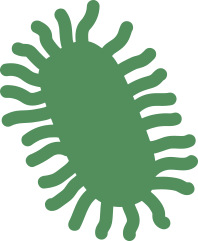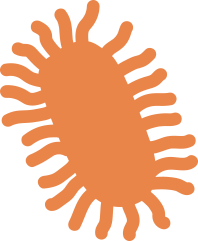The Germs of the Russian World: Who Supports Russia in Europe
In the middle of October 2016 Russian Orthodox Church opened its “spiritual and cultural center” by placing a golden-domed cupola on top of the future Saint Trinity church in Quai Branly. Nothing out of the ordinary. Except the fact that the future church was being built at a stone’s throw from Palais de l'Alma which contains the Élysée Palace’s postal service and the private apartments of senior presidential advisers. What some might dismiss as conspirology is very likely to be an attempt of using this place of worship and other Russian churches as electronic surveillance centers to eavesdrop on French authorities, Russian influence researchers say.
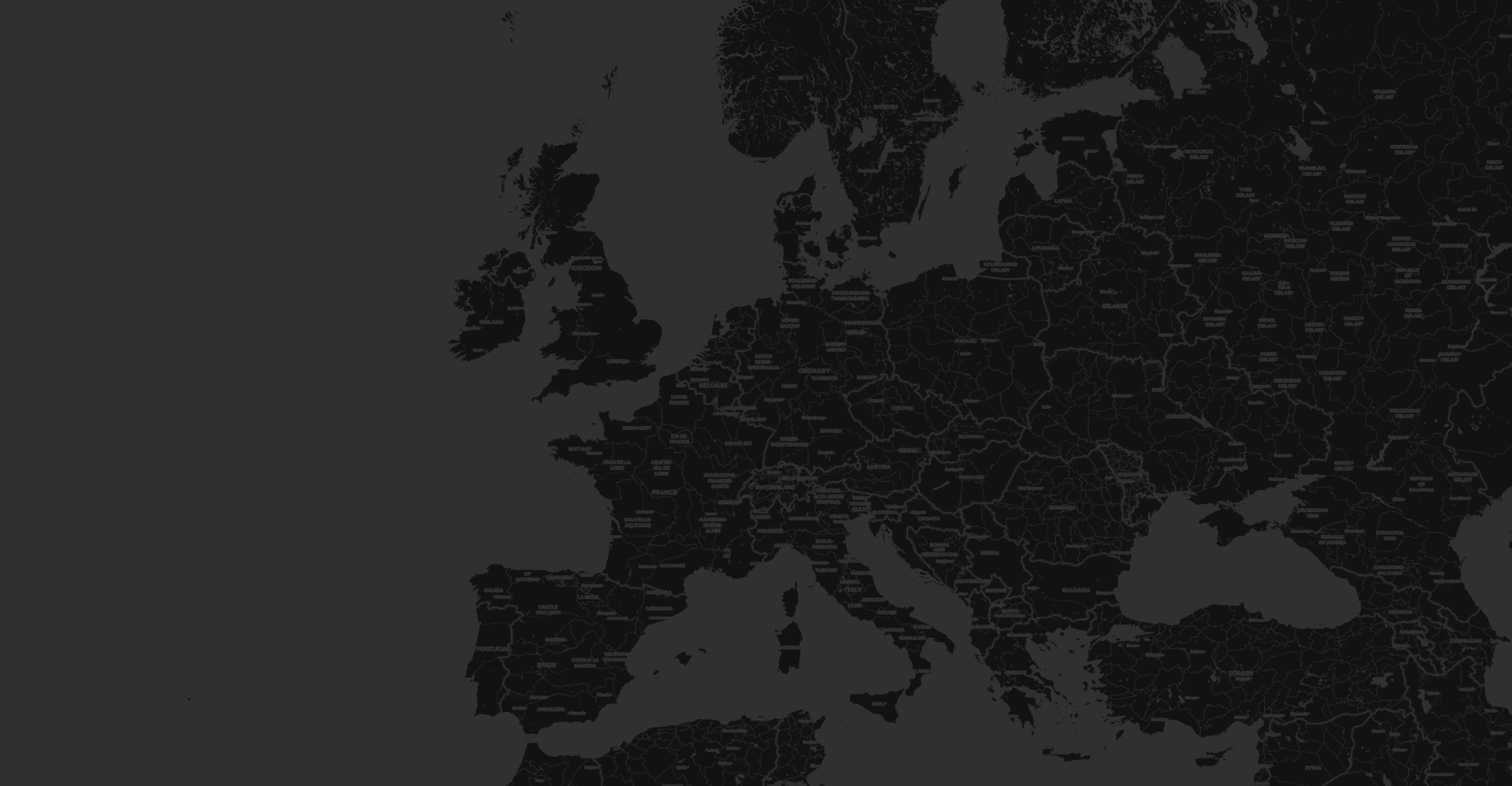
The Germs of the Russian World
1,300 people and nearly 900 organizations in 19 countries.
They all support Russia in Europe.
Background image shows real number of pro-Russian entities for each country. However, their geographical distribution is randomised, because we cannot estimate the precise location of each organisation/person.
In the middle of October 2016 Russian Orthodox Church opened its “spiritual and cultural center” by placing a golden-domed cupola on top of the future Saint Trinity church in Quai Branly. Nothing out of the ordinary. Except the fact that the future church was being built at a stone’s throw from Palais de l'Alma which contains the Élysée Palace’s postal service and the private apartments of senior presidential advisers. What some might dismiss as conspirology is very likely to be an attempt of using this place of worship and other Russian churches as electronic surveillance centers to eavesdrop on French authorities, Russian influence researchers say.
The existence of a worldwide network of Russian and pro-Russian organizations as well as numerous supporters of political and cultural projections of the so-called “Russian world” is hardly a secret. TEXTY used open sources to collect information about the potential agents of Russia at various levels, from first-tier politicians to local promoters of the Russian World, and visualized the findings.
Here is one more example from Paris. At the end of October French media reported on the Paris Prosecutor’s Office’s year-long investigation of the activities of “Dialogue Franco Russe” association which is suspected of illegal lobbying of Russian interests in France. The organization is known to be “Russia's shadow embassy”. The suspects in the case include Thierry Mariani, a member of the European Parliament for France from the far-right Rassemblement National and former senator Yves Pozzo di Borgo who share an open sympathy for the Kremlin. Earlier, they both traveled to the occupied Crimea and Russia to observe the “election”. The prosecutors have been investigating financial transactions linked to Russian companies. These funds are suspected to be under-the-table compensations provided to the politicians received for their loyalty and helping to build a positive image of the Russian regime in the international arena.
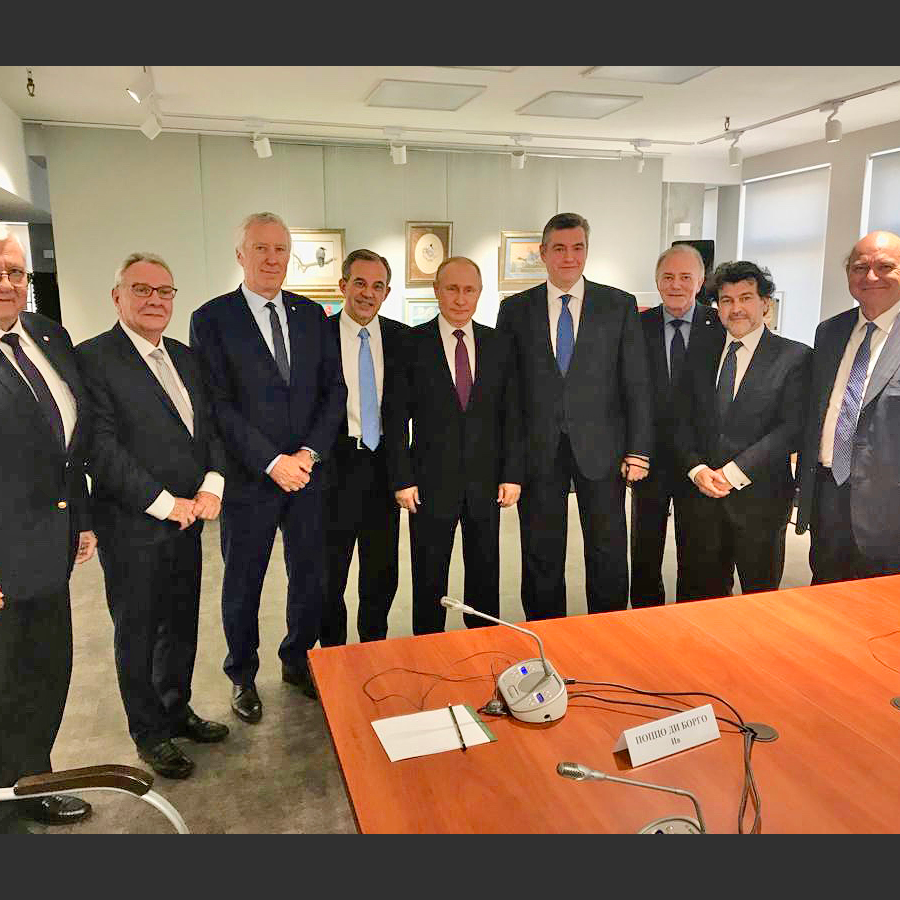
Thierry Mariani (on Putin's left) and Yves Pozzo di Borgo (far right). Photo credit: interkomitet.com
Such politicians as well as the media, civil activists, expert organizations and churches are the mainstays of Russian diplomacy which projects “soft power” by employing lobbyists both within in the public and private sector. Hundreds of such agents of influence in plain sight and those involved indirectly have been exposed worldwide through the efforts of the media, investigators and law-enforcement agencies. However, there are thousands more that still remain unknown. We used open sources to collect information about more than 1,300 individuals and more than 900 organizations in 19 countries of which 17 are EU members (Austria, Belgium, Bulgaria, Denmark, Ireland, Spain, Italy, Hungary, Germany, the Netherlands, France, the Czech Republic, Slovakia, Poland, Romania, Greece, and Sweden) plus Serbia and the UK.
The subjects of our investigation were sorted using several criteria. The first distinction was based on being “Russian” (i.e. various “associations of compatriots”, clubs, educational institutions, “centers” and “cabinets” which promote the Russian World, “Pushkin” fan clubs etc.) and “local” (i.e. local politicians and public figures which support Russia for some reason).
Then we differentiated the subjects based on their activity: politicians, the media, civic activists as well as churches and parishes of the ROC Moscow Patriarchate and its satellites.
The third distinction was based on the type of connection/collaboration with Russia. Our subjects fall into three clusters:
- funding or connections to Russian organizations;
- illegal crossing of Ukraine’s border to do business, take part in political and cultural events, observe fake elections or referendums or legitimization of Russian election results;
- pro-Russian statements, prolific meetings with Russian politicians/officials, voting in the interests of Russia (first and foremost, in the European Parliament)
That being said, the same subject may simultaneously appear in several categories. To explain why each subject was included in a particular “cluster”, we have provided links to the visualization in the subjects’ cards. Since we never intended to build an exhaustive body of evidence for potential collaborationists’ “sins”, only one link is provided to substantiate the inclusion in one of the categories. For example, if the person took part in the 2014 “election” in Donbas as an illegal observer and then attended the 2022 “referendum” in Kherson, our database will only contain a reference to the latest event.
To provide some insight into the subject, each card contains a link to his or her biography (most often from Wikipedia in the subject’s native language). If none is available, we provide references to other biographical sources (for example, work-related information, public statements, interviews or brief profiles on “Peacemaker” which is our trusted source of biographical information as well as other sources). Unfortunately, some of the subjects were only identified by their name and position.
Challenges and Limitations
All the subjects of our project were screened manually by our investigators using open sources. The first tier of our “screening” resulted in a substantial number (over 200 according to our estimates) of studies and investigations which were then analyzed for surnames and organization names which, in turn, were sorted by country. In addition to that, we also compiled lists of Russia’s partners and friends recognized as such by Russian organizations (e.g. the “partners” of Russkiy Mir (Russian World) Foundation or the experts of Valdai Discussion Club).
It was at this point that we realized that a straighforward classification of all the subjects into categories would not be possible. Firstly, we had to ascertain the current status of each “candidate”: alive (for an individuals) or active (for an organization), still in office/still shares the beliefs discovered during the investigation. All this work had to be done manually.
It turned out that Russians really tend to exaggerate the numbers of their friends. The dead souls on the list of Russkiy Mir Foundation (RMF) partners alone accounted for almost a third (more details below).
Things got even more interesting with Valdai Discussion Club “experts”. This is considered to be one of the most prominent discussion forums for the Russians to promote their ideological concepts. The “Experts” section contains a impressive enumeration of hundreds of experts from dozens of countries. At first glance, this appears to be a truly influential international organization. However, most of the contributors or participants of Valdai Discussion Club events from the 19 European countries that we studied turned out to have written 1 or 2 publications which were more often irrelevant to Russia than not. Therefore, we do not have reasons to consider them full-fledged “supporters” of Russia. Furthermore, upon manual verification, most of such experts turned out to have neutral or critical views on Russia and its current aggression against Ukraine. This is why “Valdai experts” were only classified as agents of influence if they had a history of regular pro-Russian statements and publications.
Secondly, we had to distinguish between being truly pro-Russian and playing political games and throwing accusations, and at least look out for any changes in their worldview after 24 February.
Thirdly, to maintain a reasonable scale of the map of “Russia's fans”, we had to make certain compromises by excluding subjects whose influence was potentially insignificant. For these reasons we ignored the majority of schools and extracurricular institutions which, in fact, are not much more than language courses or local kids clubs. That being said, such institutions may appear on the list of Russkiy Mir Foundation partners alongside a major pro-Russian think tank or even a political party. We hope to be able to address these imbalances in further updates.
All things considered, we would like to present a beta version of the protodatabase of Russia’s supporters to be further corrected and updated. Please feel free to contact us regarding any inaccuracies and necessary additions: all the feedback will be reviewed and considered for the next update of the project. Spoilers ahead: we are unable to tell you all the fascinating facts about the subjects of this investigation, so please feel free to browse our database and do your own research.
The Results
Group 1. Russian Individuals and Organizations
The first large group that we identified includes organizations in the countries we studied which were established by Russia. Russia spares no expense to support the “compatriots” and promote its language and culture. It also invests heavily into international exchange networks and partnerships among universities.
According to our research, the cultural expansion in most of the countries includes a number of common elements as if by the same playbook. Besides the Embassy, the consulates and the trade mission, the hierarchy of Russian influence also includes:
Russian Center of Science and Culture in the country (the so-called “Russian House”). Those are representative offices of Rossotrudnichestvo (the full name being Federal Agency for the Commonwealth of Independent States Affairs, Compatriots Living Abroad, and International Humanitarian Cooperation). They are all tasked with coordinated promotion of the language, culture and narratives at the embassy level. This is the main point of entry for the Russian culture onto the foreign turf through the doors of an official institution.
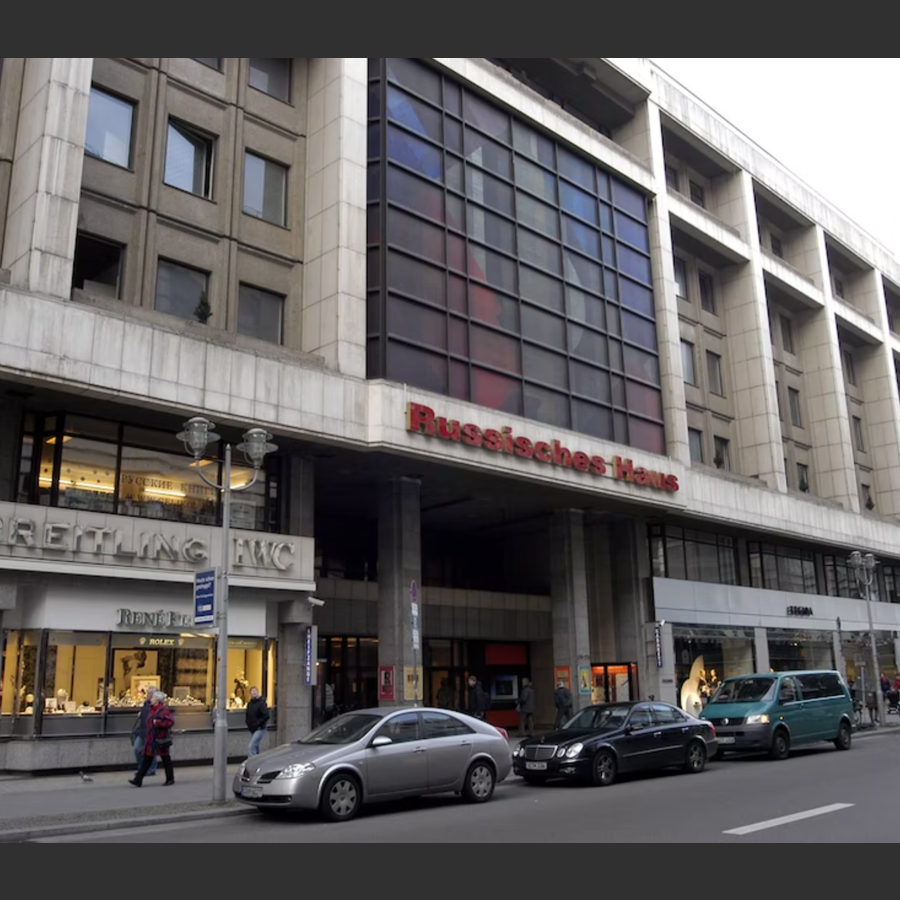
“Russian House” in Berlin. Photo credit: https://www.berliner-kurier.de/
However, some of them have been used as stages for performances to spread Russian propaganda about poor Europeans who are claimed to be flocking to their good-natured Russian friends “for a bit of warmth” from freezing-cold homes.
The name “Russian House” can also be used for local civic organizations which are not affiliated with the embassy and may operate independently.
- Local Coordination Council of Compatriots (representative office of Worldwide Coordination Council of Compatriots Living Abroad (WCCCLA). As a rule, their members are local Russian immigrants which liaise between Moscow and local communities through networks of local civic organizations. The recent scandal in Austria where Russian immigrants convinced local police officers that Ukraine in fact does not exist is a vivid example of how deep such coordination councils can integrate into the local political environment.
- Local Association of Russian Linguists / Slavonic Scholars / Teachers of Russian Language and Literature (this can be an umbrella organization or three different entities responsible for each of the three areas). While the scale of activity varies by country, such communities may be equally likely to spread pro-Kremlin political and cultural narratives or be nothing more than Russian language schools or science clubs whose activities are strictly limited to conferences and research. Such organizations can be run by either Russian nationals or local scientists/activists. Although many such organizations do not actively promote the Russian World, those who do never hesitate to refer to them as partners or friends.
- Local network of Russkiy Mir Foundation partners. As a rule, the foundation itself does not maintain dedicated representative offices. However, it may run the so-called Russkiy Mir Centers and Russkiy Mir Cabinets which are usually a mix of a classroom, a library, and a conference room equipped with appropriate literature and used as a venue for “readings”, concerts, round tables etc. (for more details see Dead Souls of Russkiy Mir” case)
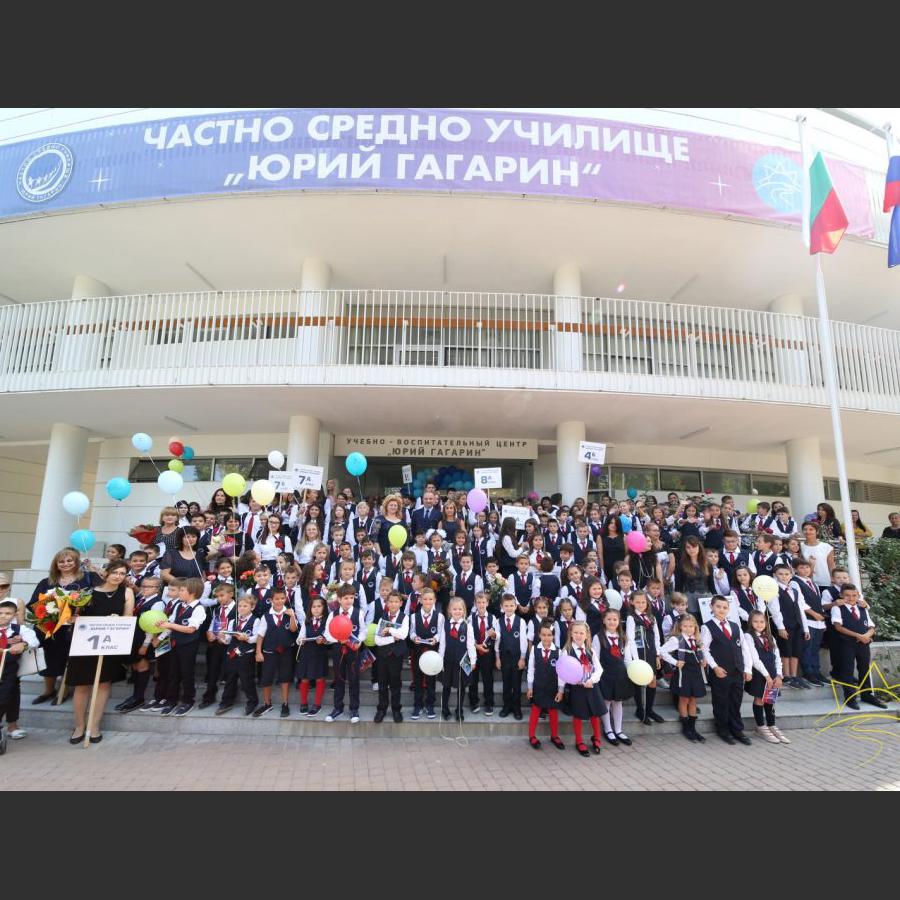
“Yuri Gagarin” training center in Bulgaria, one of the partners of Russkiy Mir (“Russian World”) Foundation. Photo credit: https://kamchia-corporate.com
- Local representative office of smaller cultural foundations — for example, State Institute of Russian Language named after A.S. Pushkin tasked with promoting the Russian language abroad.
The Ukrainian Institute has recently published a three-part study of Rossotrudnichestvo, Russkiy Mir Foundation and the Alexander Gorchakov Public Diplomacy Fund, the three leading umbrella organizations with prominent activities in this area. These studies cover their structure and the principles of their operation (see the links at the end of the text).
- Local network of Russian churches. By and large, Russian churches belong to the two largest religious organizations: the Moscow Patriarchate and the Russian Orthodox Church Outside of Russia. Although the latter followed its own path and traces its roots to the “white immigration” (at least formally), this organization has lately fallen under the control of ROC Moscow Patriarchate. Since an in-depth study of ROC hierarchy and the breakaway tendencies in its European affiliates is beyond the scope of this research, for the purposes of this project any ROC church is considered a potential agent of Russian influence in the respective country. Not all of them are as capable of actually “eavesdropping” on the highest-ranking officials as the ministers from the new church built at the foot of the Eiffel Tower next to the apartment of France's Secretary General for National Defense, but we would rather be safe than sorry. See the map of the countries we studied with an overlay of the centers of “Russian orthodoxy”.
Besides those “backbone” networks, many organizations operate without the oversight of a parent organization although they are likely to take part in the activities of the council of Russian compatriots or at least attend their annual events. Those organizations are represented by various societies, Russian schools, business clubs, kids camps, language courses or cultural associations. Their activities may be absolutely innocuous (translation services and visa services for immigrants, schools and playgroups) or they may be aggressive and even criminal.
For example, the Cultural Association of Russian Compatriots named after Dostoevski from Taragon (Spain), which advertises itself as a hobby club, doubles as “a travel agency” that arranges trips to the illegally occupied Crimea for Spanish and Russian children. The seemingly innocuous sports organization “Atlant” from the German city of Cologne turned out to be a front for a Russian political project — a party of Soviet immigrants which was supposed to spread hatred to immigrants from the Middle East and put the German internal policy in turmoil (most likely to create a backdrop for Russian propagandist media).
Since this project isn’t a witch hunt, we decided not to put all European Russian schools and playgroups to the list. However, one should keep in mind that it is such institutions (not all, but many of them) that indoctrinate the children of “those away from the motherland” with the love for “the values of the Russian World”.
There is also a distinct category of “Russians” who actively promote Moscow narratives in Europe serving as a mouthpiece of Russian propaganda. Those are self-proclaimed “aristocrats”, “descendants of white immigrants”, the “counts” and “dukes” who are still nostalgic about the Russian empire and Tsar-Father — even after living in Europe for several generations. In 2014 several dozen signatures were collected under the letter to express “solidarity with Russia in the times of Ukrainian tragedy” from “aristocrats” throughout Europe.
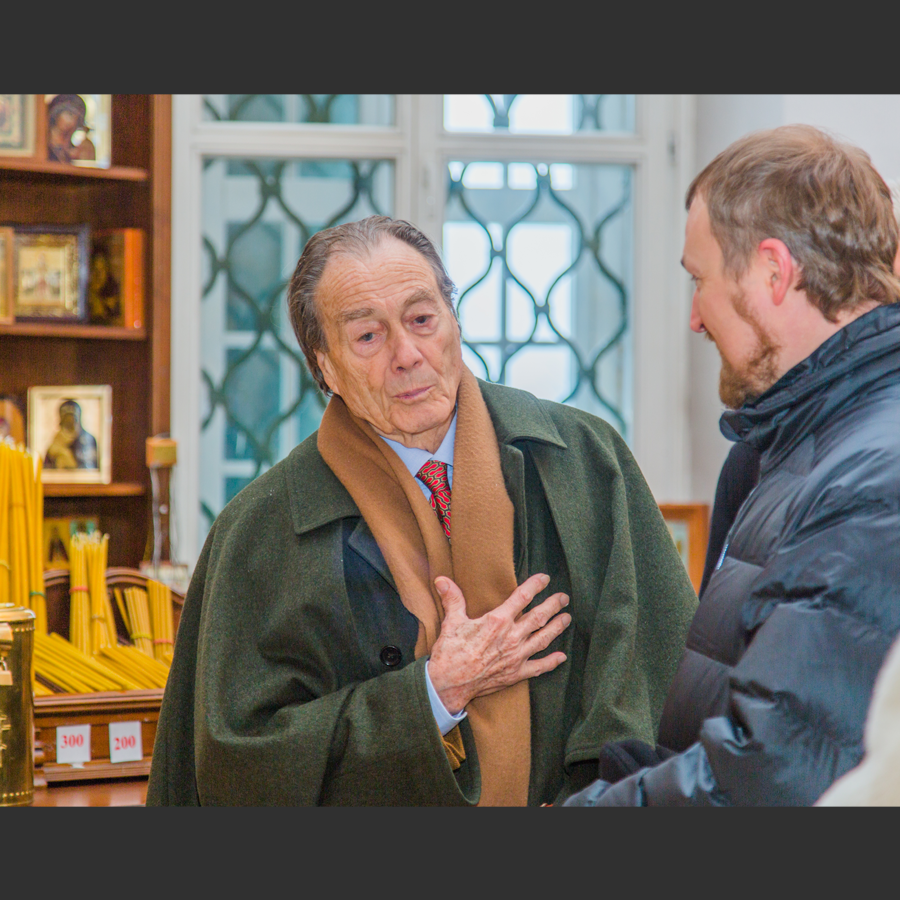
Count Pyotr Sheremetev, the Honorary Chairman of the Presidium of the International Council of Russian Compatriots (ICRC), one of the people who signed the letter of Russian aristocrats in support of the war in Ukraine. Photo credit: https://inodintsovo.ru/
As you might guess, all those Musin-Puskins, Tolstoys, Vorontsovs and Sheremetyevs “strongly denounced” growing “Russophobia” and “persecution” of Russians in Europe due to the sanctions and assured support for the people of Donbass and the criminal acts of Putin and his army in Ukraine. After that, most of those aristocratic “activists” retreated to their imaginary world of Tsarskoye Selo and carried on living their extravagant lives with no more public statements. For the purposes of our project, we only acknowledge their existence while our database includes only those who took any further steps besides signing an imperial letter.
The Dead Souls of Russkiy Mir
Russkiy Mir Foundation boasts about over 5,700 partner organizations worldwide. Although the catalog of these organizations is blocked for Ukrainian users, our colleagues from the Ukrainian Institute and MZ Hub agency were able to procure a list of 5,731 organizations which, we presume, can be the mainstay of Russian “soft power” in the world.
While the number may look impressive, we took a closer look at the structure of the list. Surprisingly, 2,712 entities (47%) turned out to be Russian-based organizations. This immediately halves the weight of the “international influence” of RMF’s ideology.
Of the remaining 3,019 entries, 967 (or 32% of the international partners) were RMF “partners” from former Soviet republics. Expectedly, Ukraine had the largest number of such “partnerships” (234 entities of which 68 were based in the occupied territories) with Estonia (121), Latvia (111) and Lithuania (121) following suite.
The remaining 1,102 entities were related to the cluster of 19 European countries being the subject of our investigation. Out of the lot, 48 entities were Russkiy Mir Centers and 41 were Russkiy Mir Cabinets at schools, libraries and higher educational establishments.
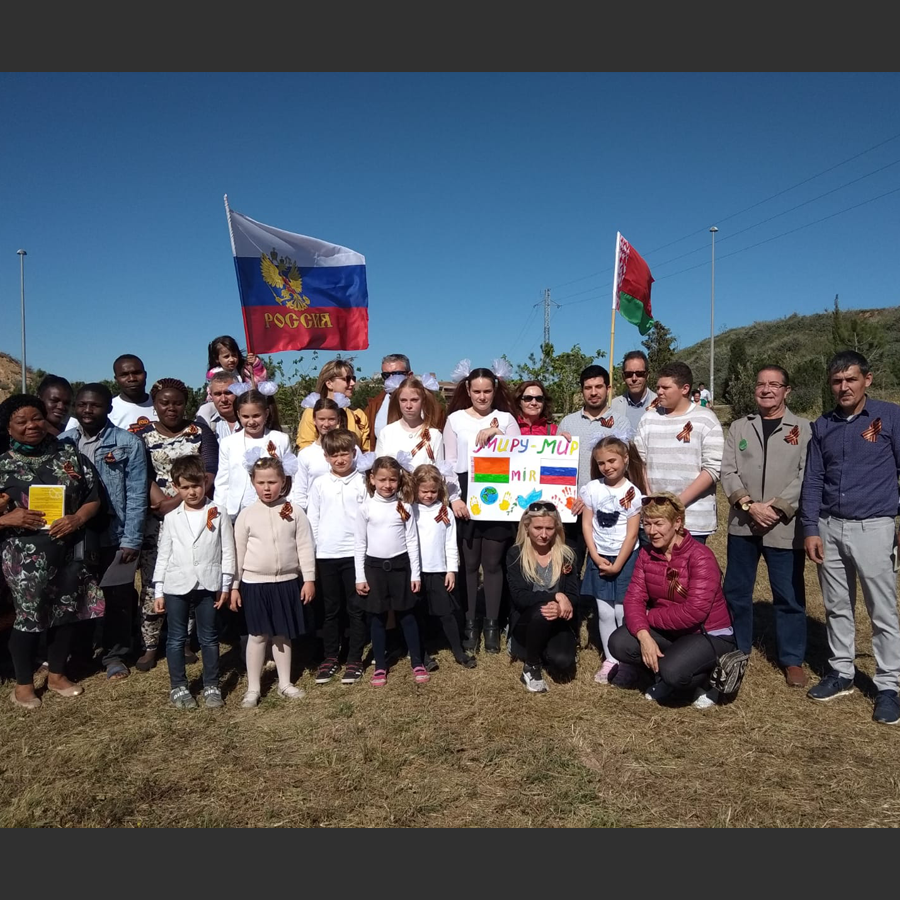
“Garden of Peace” planted in the Spanish city of Lleida under the support of Russkiy Mir Foundation. 2019. Photo credit: livejournal.ru
What about the other partners? Those are secondary schools, departments of Russian language and “Russian centers” at universities, local Russian cultural societies, associations, language courses, integration organizations offering facilitation services to immigrants, private visa centers and household staff recruitment agencies, libraries, veteran brotherhoods, local media for Russian-speaking audiences and, of course, churches. RMF also lists thematic forums for Russian immigrants, Facebook and VK communities, and KVN and “What? Where? When?” leagues etc. as partners in some countries.
Are they all the same? Is it safe to say that all the partners named by RMF are collaborationists? Here is what we found after a manual verification of almost 1,100 “friends” of the Russians which they are so proud of (so much so that they mentioned them in the catalog): at least one third of them (about 400 entities) are nothing more than dead souls. Their website/social media profile are dead or haven’t been updated for the last few years and are not mentioned anywhere except on the RFM catalog. Even if we assume that the database is “old” and was last updated in 2018-2019 (based on the most recent additions), this still does not explain why the list has so many clubs and organizations that made their last public appearances in the late naughties.
It would be safe to say that no more than 35% of all the “partners” — that is, all the organizations and individuals (who were also added to the lists if we could find at least one relevant location-based mention of the person on the Internet) were in fact active. Another 10% of the entities on the list were represented by churches, embassies, consulates, and “Russian Houses” of Rossotrudnichestvo which are inherent parts of “Russian world”.
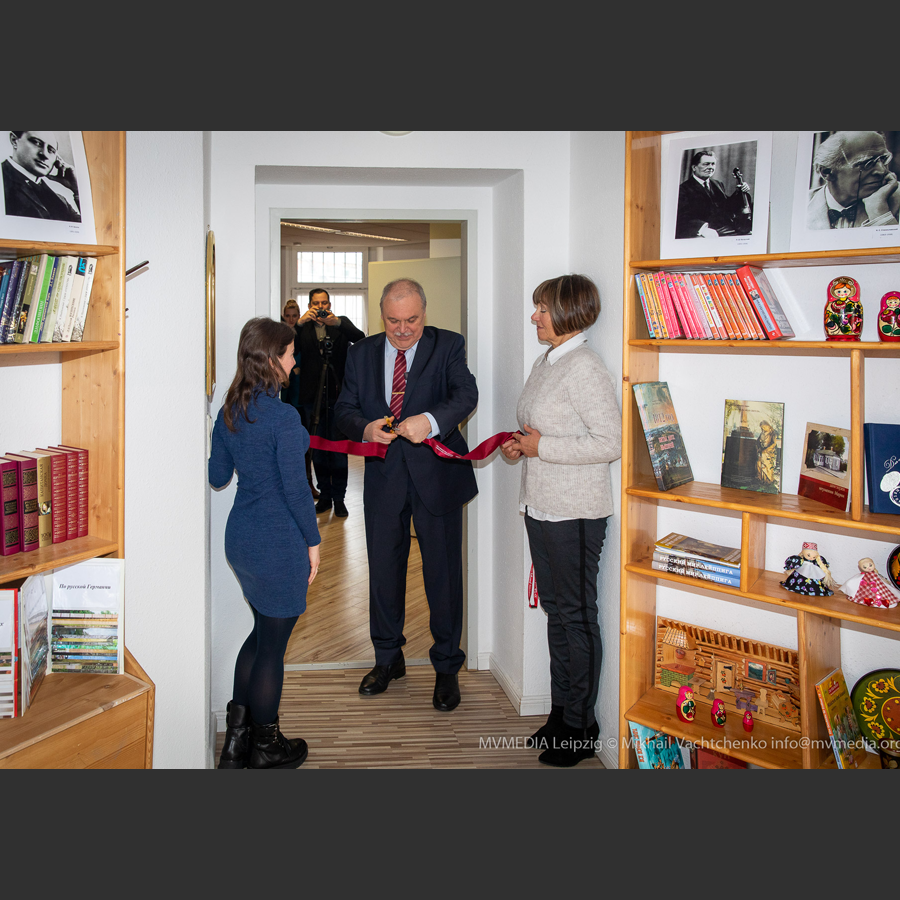
Russian consul opens “Russian World” cabinet in Leipzig, 2019. Photo credit: moct.eu
Still, there could be a far simpler and much more trivial explanation for such a staggering number of “dead souls”. Firstly, we assume that the database is copied and pasted year after year without data actualization (this theory is confirmed by the elevated (up to 5% of the entire dataset) number of repeated names in different variations). Secondly, the database may include all the individuals and organizations that interacted with Russkiy Mir Foundation at least on one occasion (e.g. received books or took part in events) without realizing that they were awarded the distinguished title of RMF partner.
Interestingly, even among the 79 “Centers” and “Cabinets” of Russkiy Mir (i.e. the projects with direct financial or organizational participation of the foundation) in the 19 countries that we analyzed only a half are still active and have evidence of their friendly relations with the Russians on their websites.
Position on Russia's War against Ukraine
Following Russia’s full-scale invasion, every tenth “partner” of Russkiy Mir came out with a public statement condemning the war and calling to help Ukraine and the Ukrainians. Such action was taken by a number of higher educational establishments in Spain, France, Poland and Sweden: most of them refused to accept any further funding from RMF and cooperate with Russian structures.
For example, the Russian Centers in Granada (Spain) and Durham (the UK) have switched to university funding while those at MCSU in Lublin as well as at universities of Wrocław, Graz and Salzburg and many others have closed down. The Wrocław-based Russo-Polish institute has changed its name to professional development institute — most likely, to avoid association with the name of the aggressor state. The Department of Slavonic Studies at the University of Vienna has updated its curriculum with more focus on the Ukrainian language. The University of Pisa has been holding conferences on various aspects of the war in Ukraine almost every month.
“Pushkin House, the oldest Russian cultural center in London, has organized a series of fund-raising events for Ukraine and Ukrainian refugees (however, its anti-war statement is rather more concerned about the fate of “good Russians” who condemned the war and suffer from “persecution” in Europe).
Russian cultural center in Amsterdam simply put up a banner on its website saying “Stop the War! We refuse to promote the culture of the country that started it”.
A similar “Say No to War!” banner was put up by Instituto Ruso Pushkin in Madrid.
Money for Ukraine is being raised by Tolstoi Society Hanover, Russian Center at West Bohemian University in Plzeň (which earlier held conferences for Rosatom), Swedish Union of Slavonic Scholars, the Association of Italian Russian Scholars and dozens of other “partners” of RMF including small extracurricular clubs and local parishes.
The Cambridge University Russian Society and the Oxford University Russian Society have not offered any meaningful reaction to the full-scale Russian invasion into Ukraine. There isn't a single word about the war on the official pages of the Russian-speaking community at Cambridge University alongside the announced appearances of opposition experts and politicians at the events and lectures. The Maslenitsa festivities held in Oxford included a fundraiser event “with all donations to be split equally between the ICRC Russian and Ukrainian partners for the ongoing humanitarian crisis in Ukraine”.
Unlike that, the Blavatnik School of Government funded by famous Russian-American oligarch Leonard Blavatnik (which often made the institution a subject of criticism) joined the petition to establish a special tribunal to bring Russia to justice for its crimes and published news about the students’ support of Ukrainian refugees.
As usual, “things aren't black and white” for some. The position of many organizations which share the Russian World values shows a marked “dichotomy”. For example, Princess Dashkova Russian Centre at the University of Edinburgh was actively involved in assisting Ukrainian orphans and students at the beginning of the invasion. At the same time, Oleksiy Kudrin, one of Putin's cronies and Chairman of the Accounts Chamber of Russia, remains an honorary member of the Center.
Although the Russian Center in Granada did refuse to accept further funding from the Russian government and is now financed by the university, it still organized a war conference of questionable merit where the visitors were shown a film by propagandists Oliver Stone and Igor Lopatonok “Ukraine on Fire” “to offer a balanced view on the events”.
Group 2. Politicians and Lobbyists
Political parties, which usually belong to the far-right or the far-left part of the political spectrum, are one of the mainstays of Russian political interests in Europe. Some of them such as Italy's Lega or Alternative for Germany are hardcore Putinists. While others may condemn the war, they still promote the idea of easing the sanctions or maintaining economic ties with Russia despite its aggression against Ukraine.
The politicians who appear on our protodatabase due to their public or indirect support of Putin's actions and Russia fall into several clusters.
The first category includes the leaders and prominent figures which belong to certain parties and are known for their regular public statements in support of the course of the Russian leadership. Some of them such as Marie Le Pen and Thierry Mariani even got into scandals due to allegations of taking money from the Kremlin. The same can be said about the Italian politicians affiliated with Matteo Salvini who is said to have sponsorship agreements with the Russians.
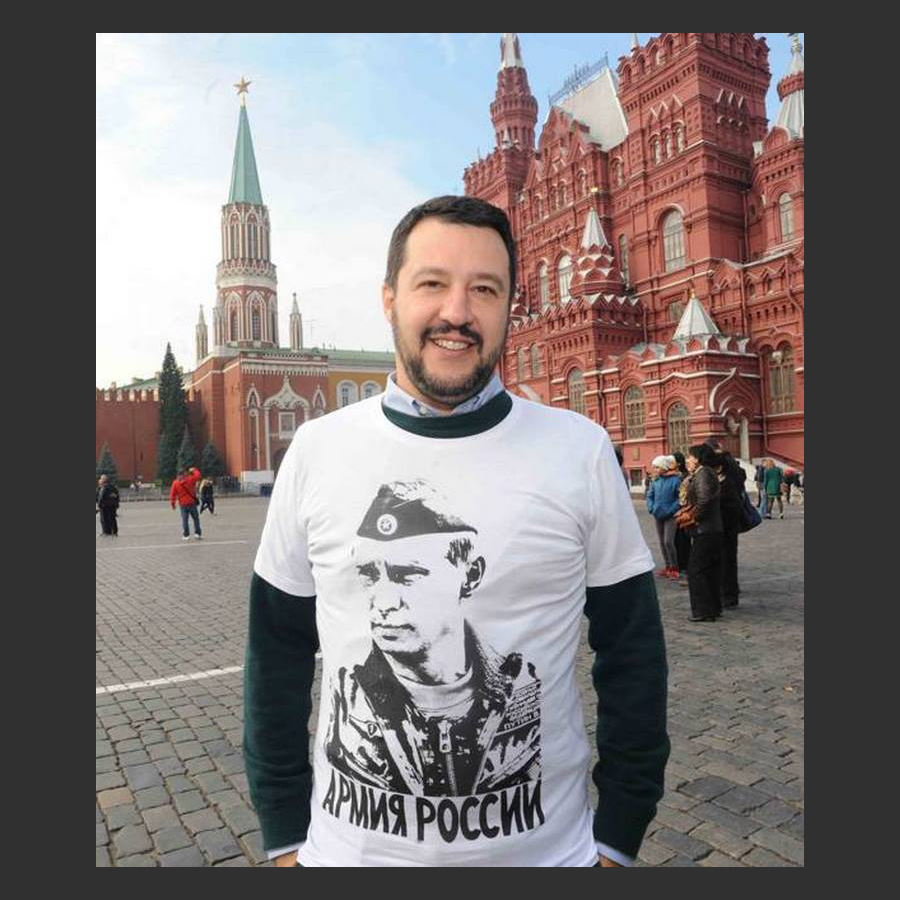
The leader of Lega Nord political party Matteo Salvini wearing a T-shirt with Putin's face print. Photo credit: Salvini's Facebook page.
The Russians often invited foreign politicians with favorable views to attend far-right or far-left forums which were sponsored by various philanthropists such as the principal Orthodox oligarch of Russia Kostyantyn Malofeev if not directly financed from the Russian budget. Furthermore, the same Malofeev and Former Chairman of the Board of state-owned Russian Railways Volodymyr Yakunin had a long history of sponsoring various events which promoted traditional values such as World Congress of Families. The organizers of International Russian Conservative Forum had a similar line-up of speakers. Such events provide ample opportunities for identifying and recruiting potential and active supporters of the Kremlin which, among other things, considers itself the last stronghold of traditional values on the planet — both among politicians and civic activists.
However, in the recent years the financing of such events ran dry or their media coverage was reduced to a minimum. As a result, the latest information regarding the participation of Russia's supporters in these events is dated 2018-2019.
Moreover, many of the participants who used to enjoy collaboration with Orthodox oligarchs have now denounced any affiliation with them.
One of such examples is Spanish-based platform CitizenGo which organizes and promotes various conservative petitions and is considered a major player on the market of lobbying for conservative values. Ignacio Arsuaga, a Spanish co-founder of CitizenGo, also used to be known as co-organizer of Yakunin's forum promoting family values. One of the seats on the Board of Trustees of the platform belonged to Russian oligarch Oleksiy Komov who was said to have ties to Malofeev. CitizenGo soon fell under complete Russian influence and its exemplary projects in Russia were studied by the rest of the network.
Following the events of 24 February, CitizenGo disavowed any connection with Moscow and closed down all operations in Russia. However, judging by the amount of dirt that has been dished on the organization by Russian propagandist media since autumn 2021, it was not the war that caused the rift.
The second category includes the current and the former members of the European Parliament who, one way or another, supported decisions for the Kremlin's benefit (or refused to support the unfavorable ones) during the last 5-7 years. There was a number of analytical studies regarding the patterns of such voting in Europe. Such matters included denouncing persecution of Crimean tatars, calling to release political prisoners, denouncing Russian aggression or supporting Ukraine.
Since our database shows the current status of such subjects, the evidence row may contain a reference to the person's pro-Kremlin vote and the description may say “former member of the European Parliament”. Such votes may be the only manifestation of a pro-Russian position for some of the subjects. However, in most cases the decision not to support a landmark vote was a perfect reflection of the position of the party that the person represented in the European Parliament.
As we were finalizing this text, the European Parliament adopted a resolution recognizing Russia as a state sponsor of terrorism. A number of EP deputies voted against this decision. We were pleased to note that more than 80% of those who supported Russia in this vote were already in our database for their previous "merits".
The third category includes the participants of illegal monitoring missions at “elections” and “referendums” in the occupied territories of Ukraine and in Russia, too, where their statements legitimized violations and election rigging.
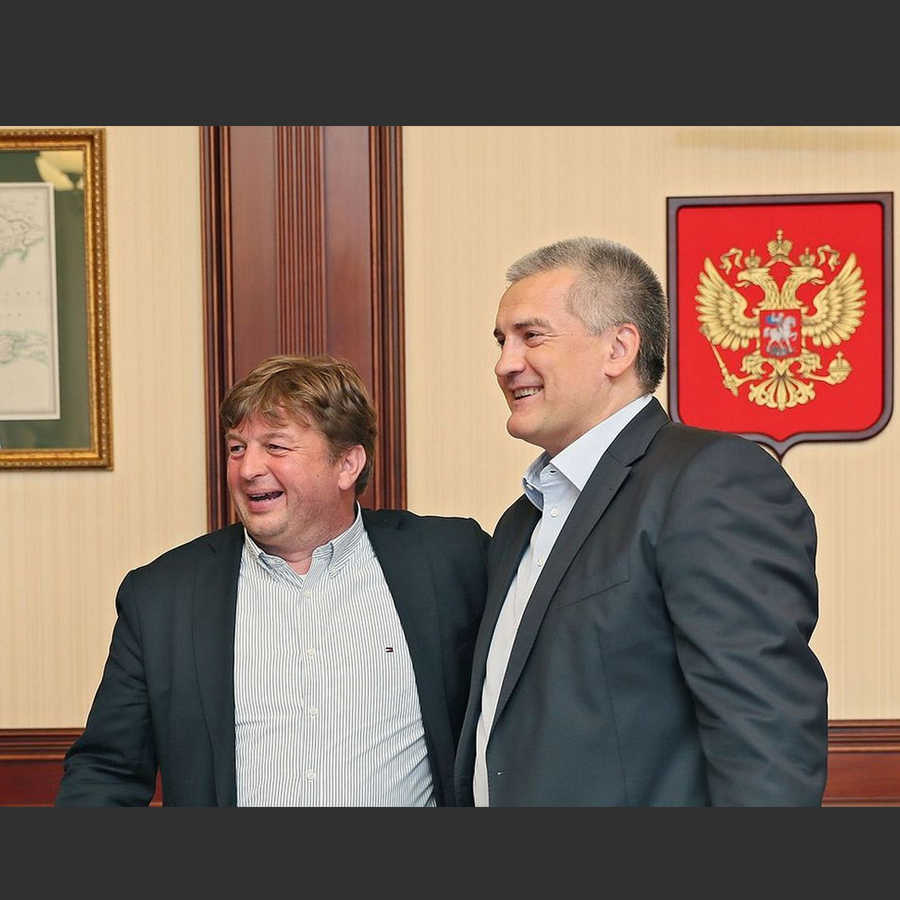
Stefano Valdegamberi, deputy of the regional council of Veneto, meets “Head of the Republic of Crimea” Sergei Aksyonov. Photo credit: KP in Crimea
Those also include the members of various national and regional parliaments who flocked to the occupied Crimea, Donetsk in Luhansk to make a quick ruble by attending conferences, festivals, round tables, setting up fake “L/DPR embassies” in Europe and helping the European public to get used to the idea of having political dialog and doing business with terrorists and occupiers. Politicians from Germany, France, Bulgaria, Italy and Greece were especially active while showing “recognition” of Russian Crimea.
Most of these people as well as dozens of cultural figures ignored the international law and came under Ukrainian sanctions as is evident from their profiles on “Peacemaker”. Many of the people on this list are “repeat offenders” as they took part in more than one mission or visited Crimea, Donetsk or Luhansk on several occasions. Certain figures settled down in the occupied territories and have been posting content on social media in their native language spreading “the truth” about “the genocide of the people of Donbas” and other Russian myths.
Group 3. Experts and Media
The spread of pro-Russian narratives in Europe is facilitated by the local far-right, far-left, conspirological or openly pro-Russian media, RT and Sputnik representative offices which are part of “Russia Today” media holding. Furthermore, the narratives of the Russian World are spread by a number of experts from universities, think tanks or by journalists who pretend to be experts on Russia/Ukraine. Russian interests are also promoted by the organizers of numerous bilateral “forums”, “dialogs”, “associations” etc.
Exemplary members of this group include bilateral “participatory dialogs” for the representatives of “civil society” which were used as platforms for political, economic and cultural cooperation by the Ministry of Foreign Affairs of the Russian Federation. “Petersburg Dialogue” served the same purpose in Germany, “Trianon Dialogue” — in France, “Sochi Dialog — in Austria while Italo-Russian Dialogue forum promoted cooperation at the level of civil society.
At the moment, all those projects have been put on hold, and not always because of Russia's war against Ukraine. For example, the “dialog” with the Germans was so active that Russian authorities put three of its members on the list of undesirable organizations.
Russia maintains more or less formalized friendly relations with almost every country in the form of bilateral trade and/or cultural associations. In some cases, more than one such organization may exist for the same country, and there are regional associations, too.
As far as the media are concerned, the local media that grist to the mill of Russia’s narratives are mostly represented by conspirological (the so-called “alternative”) or ultra-radical (right-wing or left-wing) media with a pronounced Eurosceptical and anti-American rhetoric, nationalist views and anti-government stand. Those include Anti-Spiegel or AUF media group in Germany, Aeronet in the Czech Republic, Nya Tider in Sweden, CNews in France, Blitz and dVersia in Bulgaria etc..
Similar views are also often shared by think tanks with direct or indirect affiliation to Russia. They are tasked with rationalizing breakaway processes in Europe, giving evidence of weakness of NATO and the United States, praising the greatness of Russia and lobbying its interests in their respective countries.
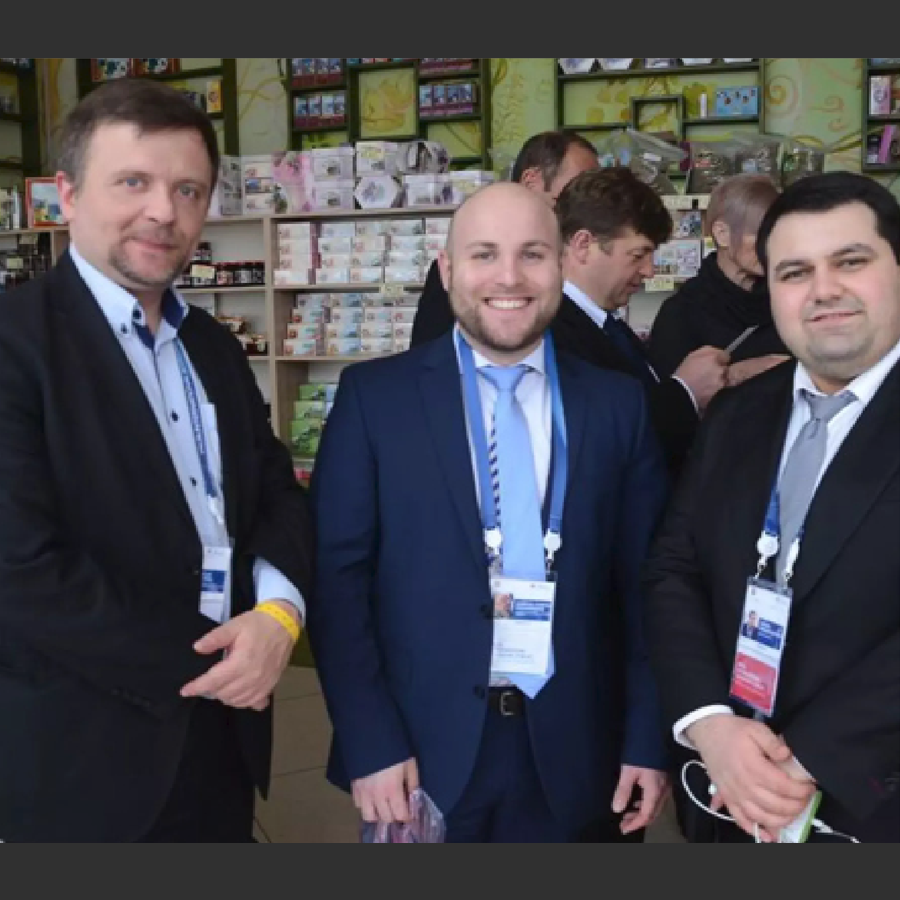
Polish pro-Russian politician Mateusz Piskorski (left) and member of the German parliament from the far-right AfD party Markus Frohnmaier (center), who also supports Russia. Drag the photo to watch more. Photo credit: https://www.t-online.de/
The Paris-based Institute of Democracy and Cooperation and the Dialogue of Civilizations Research Institute in Berlin are some of the most prominent examples of such think tanks. It should be noted, that the aforementioned Mr Yakunin was directly involved in the establishment of the latter as was the case with Dialogue Franco Russe and a series of similar organizations. There are also some specialized non-governmental organizations such as Eurasian Observatory for Democracy and Elections founded by Belgian activist Luke Michel which “observes” elections in unrecognized and non-democratic states creating the illusion of their legitimacy.
The Warsaw-based European Centre for Geopolitical Analysis founded by the Kremlin's Polish star Mateusz Piskorski also engaged in the same activities while pretending to be a respectable think tank. Similarly, there is a number of journalists such as Graham Philips (the UK), Alina Lipp (Germany), Liu Sivaya (Spain) or Fabrice Beaur (Belgium) who specialize in “spreading the truth about the bombing of the children of Donbas”.
There are many European experts who may seem to be pro-Ukrainian because they publicly condemn the Russian invasion. At the same time, they claim Ukraine to be within Russia's legitimate area of influence or urge to at least ease the sanctions against Russia. British professor Dominic Lieven who wrote a quintessential article Understanding Putin is one of the best examples of such experts.
***
The data collected as part of this project offers only limited insight into Russia’s influence on the political and social processes in Europe. Ukraine has learned from its own experience that Russian tanks are the natural extension of the Russian World doctrine. This visualization was intended to demonstrate the scale of the potential threat and help motivate officials, journalists and public activists to carry out a more comprehensive risk assessment in each country. Futher updates to this material will be provided on a periodic basis.
P. S. During the first few days after the material's publication, we received both positive and critical responses. Among other comments, we also receive signs about the erroneous inclusion of specific persons/organizations in our list. We are incredibly grateful to our readers for their active participation and help in working on this project. Corrections provided using the feedback form and comments we see on social networks will be studied and included in the database once a day. The changes will be reflected in the database.
Think tanks and state agencies which project “soft power”
- The Ukrainian Institute research:
- Hybrid Analytica. Pro-Kremlin Expert Propaganda in Moscow, Europe and the U.S.
- Bears in Sheep's Clothing. Russia’s government-funded organizations in the EU
- Large database of sources on pro-Russian institutions
- The “Russian World”. Russia’s Soft Power and Geopolitical Imagination.
Russia and political parties in Europe
- An Unholy Alliance: The European Far Right and Putin's Russia.
- Agents of the Russian World. Proxy Groups in the Contested Neighbourhood
- We know Russia funds Europe’s far Right. But what does it get in return?
- Investigationof Europe's insurgent parties with Russia
- Anton Shekhovtsov's research of the Russian connections of Europe’s far right (one and two)
- The case of Kremlin’s agent of influence in Poland Janusz Nedzvetsky
- Atlantic Council reports on the Kremlin's Trojan horses in Europe (one, two, and three)
- Russia’s influence in Bulgaria, Hungary, Slovakia, Latvia, and Serbia
- Database of examples of Russia’s exploiting divisions Europe
- Russia’s influence in Serbia
- Russia's influence in Bulgaria
- Russia’s connections to right-wing parties in Austria and Italy
- Summary of research reports on into Russia’s influence in Europe
Other sources
- Database of fake observers
- Tracker of authoritarian trends in Central and Eastern Europe (analysis of Russia's and China’s influence on members of the European Parliament from certain countries and their voting statistics)


